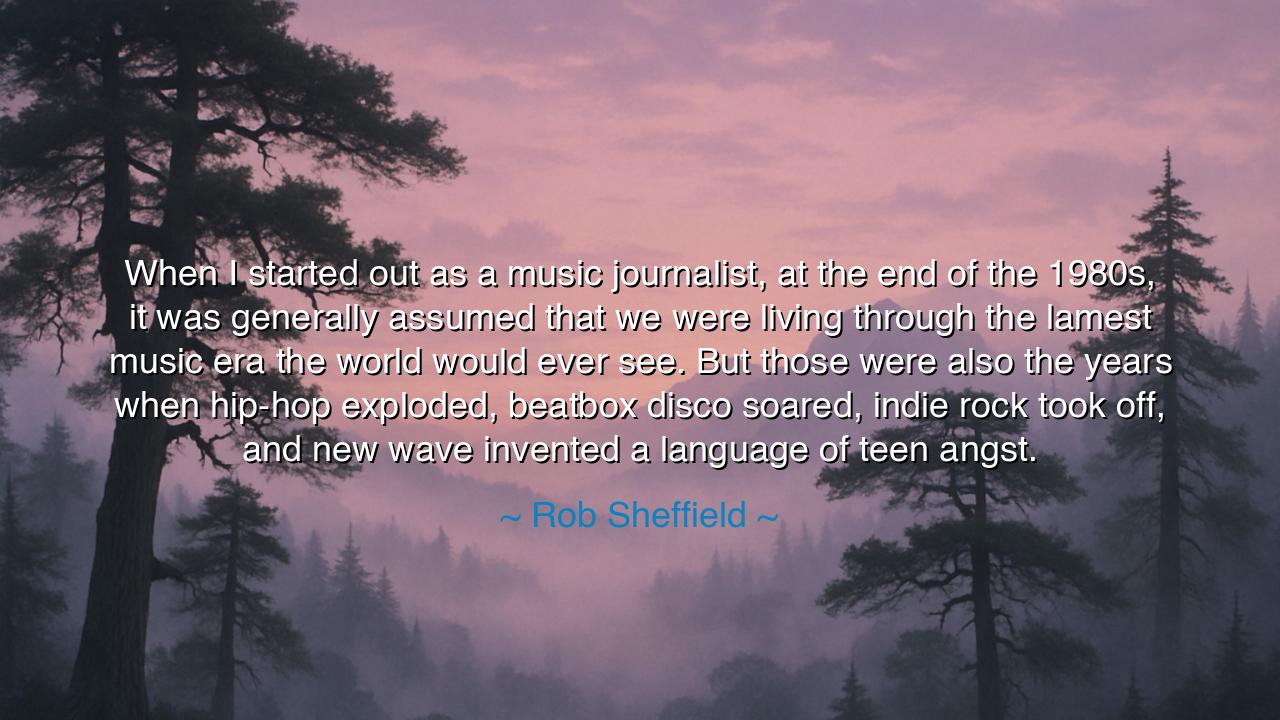
When I started out as a music journalist, at the end of the
When I started out as a music journalist, at the end of the 1980s, it was generally assumed that we were living through the lamest music era the world would ever see. But those were also the years when hip-hop exploded, beatbox disco soared, indie rock took off, and new wave invented a language of teen angst.






When Rob Sheffield declared, “When I started out as a music journalist, at the end of the 1980s, it was generally assumed that we were living through the lamest music era the world would ever see. But those were also the years when hip-hop exploded, beatbox disco soared, indie rock took off, and new wave invented a language of teen angst,” he spoke with the perspective of one who has lived inside the pulse of culture. His words remind us that what seems small or unimpressive in its own time may later reveal itself as the seedbed of transformation. What some dismissed as a weak era was in fact an age of birth, when genres that would shape generations emerged with power.
The origin of these words lies in Sheffield’s career as a critic and historian of popular music. Standing at the threshold of the 1990s, he observed how many elders sneered at the late 1980s, calling it a wasteland of superficial pop. Yet he knew better. Beneath the shiny surfaces, hip-hop was surging from the streets into the mainstream, indie rock was redefining authenticity, and new wave was giving language to the raw storm of teen angst. What seemed ordinary to many was in truth extraordinary. It is the gift of hindsight—and of those who are attuned to the heartbeat of culture—to recognize that even in so-called weak eras, greatness stirs unseen.
History teaches us this lesson repeatedly. In the Renaissance, many dismissed the early years of experimentation in painting, when figures were stiff and awkward, not knowing that these humble beginnings prepared the way for Michelangelo and Leonardo. In the jazz era, the earliest ragtime musicians were looked down upon as entertainers, not visionaries, yet from their rhythm grew a music that redefined the world. So too in Sheffield’s era: what was mocked as “lame” birthed sounds that still echo across the decades. Greatness often comes clothed in ordinary garments.
There is also wisdom here about youth and rebellion. The 1980s were an age when new voices refused to be silenced: rappers turned poetry into protest, indie bands turned small clubs into temples of authenticity, and new wave artists gave teenagers a mirror for their restless spirits. Music, Sheffield reminds us, is not only about entertainment—it is about identity, defiance, and truth-telling. Each generation invents its own language of sound, and though the elders may dismiss it, time reveals its enduring power.
Sheffield’s words carry an even deeper lesson: beware the arrogance of declaring any age “the lamest.” For judgment in the moment is often blind. What one era dismisses, another may revere. This is true not only in music, but in art, literature, and even in the lives of people. Many who seem ordinary, even unimpressive, may later prove to be innovators who changed the course of their field. We must learn to listen with patience and discernment, for treasures often emerge where none expected.
The lesson for us is to remain open to the voices of the present. Do not mock the songs of youth, nor the experiments of the new, for in them may lie the movements that will shape tomorrow. The rhythms that irritate one generation may be the very anthems that give strength to the next. Learn to hear not only the surface, but the undercurrent of what is rising. To honor creativity in its infancy is to honor the future itself.
Practical counsel flows: if you are a creator, do not be discouraged when your age or your work seems “lame” in the eyes of others. Keep building, keep experimenting, for time may reveal the greatness hidden in your struggle. If you are an observer, practice humility—recognize that what you dismiss today may be cherished tomorrow. Celebrate the courage of those who give voice to their era, for they are the keepers of its spirit.
Thus let Rob Sheffield’s teaching endure: there is no such thing as a wasted era, for every age gives birth to new voices. What seems ordinary may be extraordinary in disguise. Listen carefully, honor creativity, and remember that even in the overlooked seasons of history, the seeds of greatness are quietly growing.






AAdministratorAdministrator
Welcome, honored guests. Please leave a comment, we will respond soon